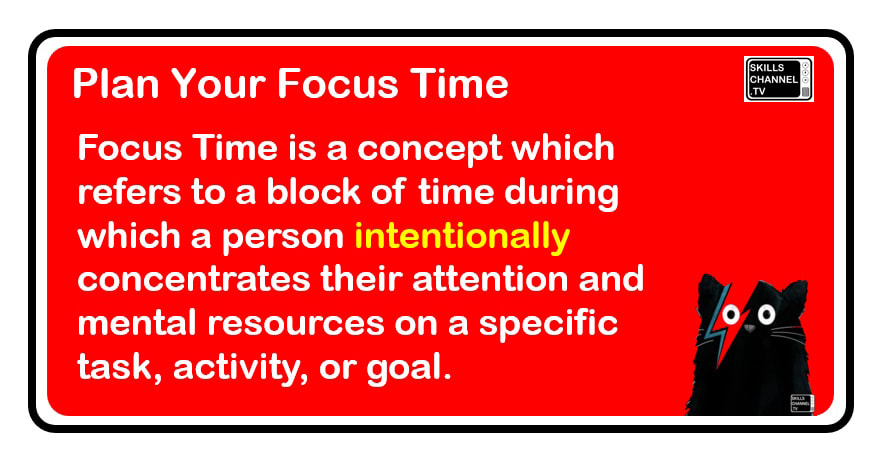|
The Basics of Focus Time
Focus Time typically refers to a period or block of time during which a person intentionally concentrates their attention and mental resources on a specific task, activity, or goal. It is a time when distractions are minimized or eliminated to optimize productivity and efficiency. In this overview, creative sector coach Alec McPhedran of Skills Channel TV, explains one of the time management models he uses in coaching sessions. Focus time is essential for tasks that require deep thinking, problem-solving, creativity, or undivided attention. During focus time, people often work on important projects, engage in critical decision-making, study, or complete complex assignments. To make the most of focus time, some common practices include: Time Blocking: Allocating specific periods in your schedule dedicated to focused work. If you have a shared diary, enter Focus Time and educate people around you on what that means and why it is there. Minimizing Distractions: Turning off notifications, closing unnecessary tabs or applications, and creating a quiet, uncluttered workspace. Setting Goals: Clearly defining what you want to accomplish during your focus time. Using Techniques: Employing productivity techniques like the Pomodoro Technique, which involves working for a set period (e.g., 25 minutes) and then taking a short break. Prioritizing Tasks: Tackling the most important or challenging tasks during your peak focus hours. A tool like the Eisenhower Matrix is useful here. The Pareto Principle or the 80/20 Rule helps you to think about the impact of the Focus Time task you plan to work on. Self-care: Ensuring you're well-rested, hydrated, and nourished to optimize your cognitive abilities during focus time. Equally the environment you choose to work in on your Focus Time is also important. Single-Tasking: Focusing on one task at a time rather than attempting to multitask. The concept acknowledges that our ability to concentrate on demanding tasks is limited and that we can be more efficient and effective by managing our time and environment to support concentrated, distraction-free work when it's needed. The goal of Focus Time is to work continuously on the same task until it’s complete, instead of allowing your attention to be pulled in different directions by various tasks and activities. This can help you stay focused and productive. It can also help you get more done in a shorter amount of time. Alec McPhedran Chtd Fellow CIPD, Chtd Mngr CMI, MAC, MCMI is the managing director of Skills Channel TV, a training company for talented creative people. He specialises in one to one coaching, facilitated learning, media training and team development. For further information, contact 0121 366 87 99 or visit www.skillschannel.tv.
0 Comments
|
AuthorA trainer, coach and facilitator helping people acheive. Archives
November 2023
Categories
All
|

 RSS Feed
RSS Feed
